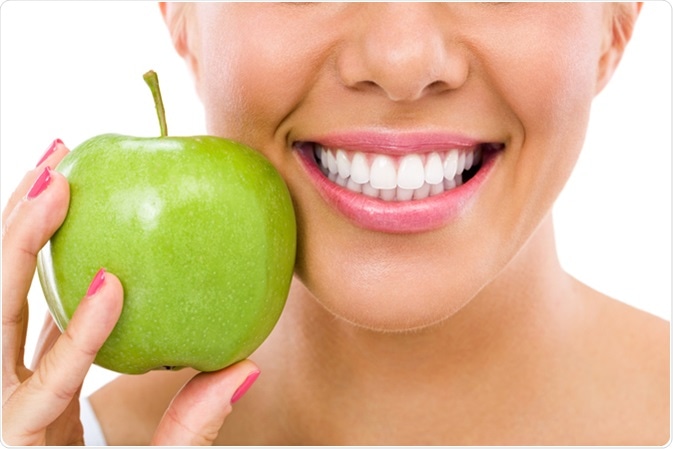Foods play crucial role in maintaining oral health. Eating a well-balanced, healthy, and nutritious diet is vital for good dental health both in children and adults.
Proteins and Tooth Damage
Proteins are vital for the formation and maintenance of the tooth structure. They also protect the mucosa and the connective tissue lining the oral cavity, and contribute towards a healthy immune system. Foods rich in proteins include soy, eggs, beans, poultry, seafood and dairy products.

Image Credit: Lucky Business / Shutterstock
Calcium and Phosphorous
Calcium and phosphorous comprise the structure of teeth and help prevent against brittleness. Calcium promotes a process known as remineralization, which reverses the tooth damage. Zinc propels the formation of the mucosal layer and connective tissues surrounding the oral cavity.
Milk and dairy are rich in calcium and phosphorous Other foods which are a great source of calcium include seafood, tofu, almonds, green leafy vegetables, legumes and broccoli.
Cheese is a rich source of calcium which protects teeth due to its adherent nature. Once it sticks to the tooth surface, it releases the calcium, which intermingles with the plaque on the tooth surface. Calcium helps in repairing the damaged tooth structure by the process of remineralization.
Vitamin D
Vitamin D stimulates the growth and proper functioning of mucosa and the connective tissue. It also promotes the remineralization process by helping calcium absorption in the body. Sunlight is the richest source of Vitamin D. Other sources rich in this vitamin are milk, fish, eggs, and cod liver oil.
Vitamin A
Vitamin A is essential in maintaining the mucosal lining and connective tissues supporting the teeth. Carrots are good source of vitamin A., as are orange fruits, sweet potatoes, dark leafy greens vegetables like spinach and kale. Egg yolk and fish also contain vitamin A in good proportions.
Vitamin C
Vitamin C promotes the integration and remodeling of the collagen (a structural protein). It is also responsible for maintaining the structure of the periodontal ligament (structures that support the teeth and gums). Foods such as lemon, oranges, sweet potatoes, peppers, broccoli, berries, kale, and berries are good sources of vitamin C.
Vitamin B
Vitamin B helps in the growth and development of new epithelial cells lining the oral cavity. Vitamin B is found in high amounts in fish, red meats, milk products, poultry, legumes, almonds green leafy vegetables like spinach.
Vitamin E
Vitamin E acts a great antioxidant. Foods rich in Vitamin E include nuts, almonds, green leafy vegetables and avocado. Fish is also a good source of Vitamin E. Green tea contains catechins, which is rich in antioxidants.
Foods Rich in Iron, Potassium, Fluoride, and Iodine
Potassium is an essential trace mineral which helps in blood clotting, especially when gums bleed after an injury. Fluoride prevents the tooth decay by the process of remineralization and iodine also promotes the absorption of calcium in the body.
Eggs, seafood, red meats, cereals, and green leafy vegetables contain good amounts of iron. Tap water is a source of fluoride and other sources rich in fluoride are black tea and seafood. Iodized salt, seafoods such as shellfish, sesame seeds, squash, and garlic provide requisite amounts of iodine.
Foods with a High Water Content
Crunchy and firm fruits including vegetables have a high water content. Eating these fruits and vegetables results in the formation of high amounts of saliva, which maintains the pH balance of the oral cavity, thereby protecting teeth from cavities. These foods are also good at removing the plaque from the teeth. Celery, carrots, cucumber, and apples are high in water content.
Probiotics
Probiotics such as yogurt, curd, fermented foods, miso, kombucha and sauerkraut help in the production of good bacteria, which can prevent the formation of plaque.
Xylitol-Sugar-Free Gum
Xylitol stimulates the production of saliva. It also inhibits acid producing bacteria in the mouth, thus restricting cavities. Chewing xylitol gum after a meal promotes good dental health. Apples are a major natural source of xylitol.
Further Reading
Last Updated: Feb 27, 2019